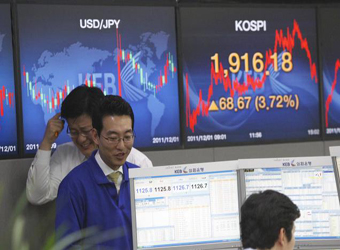In Australia, the ASX 200 climbed 0.39 percent, with most sectors notching gains. The heavily weighted financial sector gained 0.86 percent as major banking names in the country rose.
Shares of ANZ were up 0.59 percent, Commonwealth Bank was up 1.22 percent, Westpac was higher by 1.28 percent and the National Australia Bank added 0.97 percent.
Major miners in Australia, however, were down — Rio Tinto shares fell 1.98 percent, Fortescue was lower by 3.31 percent and BHP Billiton lost 0.35 percent.
Japan’s Nikkei 225 was up 0.67 percent while the Topix index gained 0.73 percent. Across the Korean Strait, the Kospi fell 0.22 percent. In Hong Kong, the Hang Seng index rose 0.96 percent.
Chinese mainland shares were also higher; the Shanghai composite was up 1.4 percent and the Shenzhen composite added 1.01 percent.
Analysts at Singapore’s OCBC bank wrote in a morning note that market sentiment overnight was affected by “multiple factors including higher yields, mixed earnings, still solid U.S. growth data and eased sanctions on Russian aluminum producer Rusal.”
Further strength in the U.S. dollar also marked the overnight session, according to David de Garis, director for economics and markets at the National Australia Bank.
“The dollar has been on a further tear, taking up in Europe where the trading mood ended last week,” he wrote in a morning note.
The dollar index, which measures the greenback against a basket of currencies, traded at 90.997 at 10:04 a.m. HK/SIN, up from levels below 89.500 in the previous week.
The index had “been testing its highs for this year seen in the earlier part of January,” de Garis said. “It’s been a yield driven story, with rises in U.S. yields along the curve.”
He added that the market was pricing toward three rate hikes from the U.S. Federal Reserve this year.
In currency pairs, the Japanese yen traded at 108.8 to the dollar, and the Australian dollar fetched $0.7602 as of 10:04 a.m. HK/SIN, declining from levels above $0.777 in the previous week.
Elsewhere, oil prices rose during the Asian session on Tuesday, with U.S. crude climbing 0.38 percent to $69.9 a barrel. Global benchmark Brent was up 0.27 percent at $74.91.
“Crude prices are now sitting at the highest levels in three years, reflecting ongoing concerns around geopolitical tensions in the Middle East, which is the source of nearly half of the world’s oil supply,” Giulia Specchia from ANZ Research wrote in a morning note.
Higher energy prices were also supported by a decline in inventories at the Cushing, Oklahoma storage hub for U.S. crude, according to Reuters.
Source: CNBC


